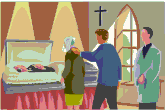|
Funeral Service Etiquette
Funeral service etiquette may differ among various communities, ethnic groups, religions and customs.
The service may be held at a funeral home, church, temple, residence or somewhere else appropriate to commemorate the life of the deceased.
The funeral service is usually conducted by a member of the clergy, celebrant, family or friends. If you are unfamiliar with the funeral service etiquette for that particular culture or religion of the family, do not worry. Simply be guided by the family of the deceased.
In some religions it is part of funeral service etiquette to have a formal visitation at the Funeral Home before the actual funeral. A formal visitation provides a time and place for friends to offer their expressions of sorrow and sympathy. This practice is most common among the Christian faiths whether they be Catholic or Protestant.
The obituary should list the visitation hours and when the family will be present, it will also list when and where the funeral service is to be held.
It is good funeral service etiquette on arrival to immediately go to the family and express your sympathy. If you were an acquaintance of the deceased but not known to the family, immediately introduce yourself.
Do not feel uncomfortable if you or the family member becomes emotional or begin to cry. Allowing the family to grieve is a natural healing process, also don't feel as though you must avoid talking about the person who had died.
Religious Belief - is it appropriate to attend if I am not of the same religious belief? Funeral service etiquette is not about your personal belief, it is a time when friends and family come together to lay a loved one to rest. Funeral services differ depending upon the religion and personal beliefs of the family. The funeral service can be held at a church, temple, funeral home, or even the residence. No matter where the funeral service is held, dress appropriately, enter quietly and be seated. The first few rows are usually reserved for family members. If the service is held in a church or temple not of your religion, just follow what the family is doing if you wish to participate. It would be wise to ask to stay close to a person of the faith of the family for guidance in rituals and practices that you should not participate in. Eulogy In funeral service etiquette usually a family member, clergy, close personal friend or business associate may provide the eulogy. However, if you are completely overwhelmed by the prospect, it is ok to decline. Just be honest and explain why, people will understand that this is a painful and emotional time. It would be difficult to keep one's composure and not break down in the middle of the eulogy. Not only would you feel embarrassed, but it would be upsetting to all attending the service.
This is a special time to share the deceased person's life, contributions, commendations, and lightly humorous personal stories. The eulogy is usually planned out and expressed in a way that gives meaning to the words. Special poems and verses can be added to personalize this event.
Family members, especially, like to hear words about their loved one. Take some time in planning this special segment of the service as it can bring peace to family and add a special touch of sharing with others the last remembrances of the loved one. Practice in front of some close friends or relatives so that you feel confident and in control on the day of the service.
Cremation - Ashes - the where, what and how Generally in funeral service etiquette the ashes can be scattered in a garden of remembrance, or a favorite spot chosen by the deceased, they can be buried in a churchyard or cemetery or kept in an urn. You need to check the law with regards to the scattering of ashes on ordinary land, ocean or in rivers. There is, however the issue of consent being needed to put something on someone else's land. If you are placing ashes in your own garden then there is absolutely no problem. Remember that you may move from that house in the future. It is important to make quite clear your wishes about the ashes. If no wishes have been expressed, it is the responsibility of the crematorium staff to contact the relatives before disposal. Arrangements can be made for the placing of a memorial plaque at the crematorium.
Funeral and memorial service - what is the difference? A funeral service is a ceremony that takes place with the body of the deceased present. A memorial service is a ceremony honoring the deceased without the body present. Also a memorial service can take place at any time. For example some people hold a memorial once a year on the date of the deceased's birthday. Seating Arrangements At the Funeral or Memorial Service it is good manners to show consideration for the bereaved by saving the first row of seats for the immediate family of the deceased – firstly, parents (including grandparents), spouse, children, sisters and brothers and their spouses. The next row should be saved for aunts and uncles, grandchildren, cousins, nieces and nephews and so on. In general, the closer the emotional attachment and blood relationship to the deceased the closer to the front they should be seated. Conversely, all the rest should be seated further back. Memorial Gifts A memorial gift is always appropriate, especially when the family has requested such a gift in lieu of flowers. Usually the family will designate a specific organization or charity. Remember to provide the family's name and address to the charity so they can send proper notification. It is acceptable to mention your gift in a sympathy note without mentioning the amount of the gift.
Register signing - is it for family only? It is good funeral service etiquette for all who attend the funeral to sign the register and leave a short note stating your connection to the deceased otherwise the family may not know who you are. Your presence there will be appreciated by the family and they will probably want to acknowledge this by sending you a thank you card.
Is it usual Funeral Etiquette to send out thank you notes? Anyone who presented or sent a gift or card to the family, deserves a thank you note. Examples would be to thank anyone who has sent in a memorial contribution, brought food to the house of the grieving family, sent flowers, signed the register at the funeral service or in some other tangible way acknowledged the death.
There is no official time frame in funeral service etiquette for writing notes of appreciation to those who have extended their condolences and kindness to you. The best thing is to work things through at your own pace. Another option, is to ask a close relative or friend to write some notes on your behalf. It's up to you.
Clergy - is it accepted funeral service etiquette to send an offering and thank you note? A personal note is recommended for thanking your clergy person. If an honorarium or offering is sent, send it in a separate envelope. Do not include it with the thank you note.
Is it funeral service etiquette to view the deceased?

No. Viewing the deceased is not mandatory. However, it is customary to show your respects by viewing and spending a few moments in silent prayer. If the funeral service is proceeding to a secondary location such as a cemetery, a funeral procession led by the hearse may be formed. Please turn on your headlights so you will be identified as part of the procession, Graveside funeral service etiquette. If there is a graveside service, the chairs at the coffin or casket are reserved for immediate family members. You may also be interested in...
Can't find what you are looking for? Try our Google Search below:
We would love you to share your experiences and views on our Interactive Visitors Forum Funeral Service Etiquette. Your contribution if appropriate, may be published on our Rage Page. Back to our A - Z Guide.
|



